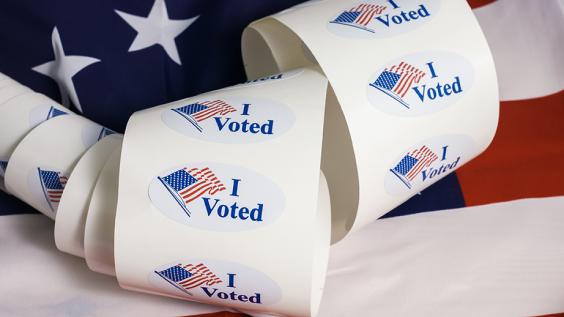Election 2020: Kamala Harris Is Biden’s Choice for VP. How Will the Next 90 Days Unfold?

Table of Contents
Author(s)
Election Day is now just three months away. Some polls indicate that Joe Biden currently has a lead over Donald Trump, but will that last? And how will Biden’s recent pick for vice president — Sen. Kamala Harris— impact his campaign? To offer insight into what might happen in the final 90 days, political science fellow Mark P. Jones answers some of the most pressing election questions.
How Will Biden’s Vice-presidential Choice — Sen. Kamala Harris — Affect the Outcome of the Presidential Election?
Normally a presidential candidate’s choice of a running mate has little effect on the actual outcome of the election. This year, however, Biden’s choice is expected to have a greater impact than usual given Biden’s advanced age and the reasonable probability that he may not seek a second term in 2024 if victorious. If Biden wins in November, he will be 78 when he assumes office in January 2021, making him the oldest person to ever serve as president (Ronald Reagan was 77 when he completed his second term in January 1989).
These issues, combined with concerns about Biden’s current cognitive abilities, could very well result in Kamala Harris either assuming office at some point during Biden’s first term, if he is incapacitated, and/or being the Democratic Party’s presidential nominee in 2024. As a result, we should expect higher scrutiny of her ability to serve as president by both the media and the Republican Party. Republicans will likely signal to voters that if they vote for Biden, they should assume that Harris will become the president of the United States at some point over the next four years. That reality perhaps influenced Biden’s choice of Harris, since among all of the leading candidates to be his running mate, Harris’s political resume and gravitas make it very easy to imagine her as the president of the United States, something that is not as easily said in regard to her principal rivals for the position, such as Susan Rice and Karen Bass.
Will Biden’s Lead in the Polls Last?
Barring a Trump presidency that careens out of control over the next three months if faced with the rising prospect of defeat in November, we should expect Biden’s lead over Trump in the polls to narrow for three reasons, the latter two of which are conditional on other factors.
First, at some point Joe Biden will have to leave his basement and face the media and public in a much less controlled and scripted manner than has been the case over the past few months. And, as much as many in the media want to see Trump defeated, all professional journalists will do their best to provide balanced coverage, which will involve analyzing and discussing Biden’s inevitable gaffes on the campaign trail, any signs that his cognitive abilities are deficient and any issues related to his vice-presidential nominee. This should result in more negative media coverage of Biden than has been the case thus far, resulting in his lead in the polls narrowing.
Second, right now Donald Trump’s support has been eroded by the combination of a weak economy and, thirdly, his weak response to Covid-19. To the extent to which the economy strengthens and Covid-19 weakens between now and November, we should see Biden’s lead in the polls narrow.
Which States Will Be Major Battlegrounds? Will Texas Become a Battleground State?
At the present time, Joe Biden possesses a notable lead in the Electoral College. He has an estimated 278 electoral votes from states (and/or congressional districts in Maine and Nebraska) where he is a lock to win (188), likely to win (30) or where the state is presently leaning toward Biden but could still be won by Trump (60). In sum, Biden currently appears to have 218 electoral votes in the bag and only needs 52 votes from states/congressional districts that lean Democratic (60) or are labeled as toss-ups (73) to win an absolute majority in the Electoral College (270).
Donald Trump’s most straightforward pathway to victory involves winning all of the states currently rated as “toss-ups” (Arizona, Florida, Georgia and North Carolina) as well as winning at least one or two (if one is New Hampshire) of the states that are presently leaning toward Biden: Michigan, Minnesota, New Hampshire, Pennsylvania and Wisconsin. This is in addition, of course, to Trump winning all of the states (65 electoral votes) that are presently leaning toward him but that could still be won by Biden (Iowa, Montana, Ohio and Texas).
This means, at least for now, that the 2020 election is expected to be primarily fought in nine battleground states (electoral votes in parentheses): Arizona (11), Florida (29), Georgia (16), Michigan (16), Minnesota (10), New Hampshire (4), North Carolina (15), Pennsylvania (20) and Wisconsin (10).
Texas will not become a battleground state in the true sense of the word. If Texas was truly competitive, that would mean that Trump was doing so poorly nationally that he would have already lost hope in most of the toss-up and Democratic-leaning states. Texas’ 38 electoral votes would be unnecessary to cement a Biden victory in this scenario. If Trump finds himself at serious risk of losing in Texas as we enter into October, it would portend a landslide Biden victory nationwide.
How Will Covid-19 Affect Voter Turnout?
I do not expect Covid-19 to have much of an adverse impact on voter turnout this year, not even in states like Texas where voters under 65 technically cannot request a ballot based on the fear of contracting Covid-19. In Texas, voting in-person will be just as safe if not much safer than going to the grocery store or to a small family gathering. Only those who have engaged in extreme quarantining and are under age 65 (those 65 and older can request a mail ballot for any reason) may be forced into the dilemma of choosing between exercising their right of suffrage and putting their own health or that of a family member at risk. In addition, the Texas Supreme Court has left it to voters to determine if they truly believe their future health would be put at risk by voting. If they check “Disability” on their mail ballot request form, county election officials will accept it at face value and mail them a ballot. This provides an unpublicized back-door way for Texas voters who fear contracting Covid-19 to still request a mail ballot.
Will Biden’s Strong Position on Climate Change Help or Hurt His Chances of Winning Oil-rich Texas?
The combination of Biden’s proposed oil and natural gas policies and the proposed policies of progressive Democrats as part of the Green New Deal (both of which would adversely affect the Texas oil and natural gas industry) hurt his prospects for victory in Texas. This negative impact on Biden’s vote share will be greatest in those areas of the state that are most dependent on the oil, natural gas and petrochemical industries (e.g., metro Houston, Permian Basin, Eagle Ford and Golden Triangle) and among those voters whose livelihoods or well-being is closely related to these industries in other parts of the state.
What Important or Divisive Topics Could Impact the Outcome of the Election?
I expect the following six topics to have the greatest impact on the outcome of the presidential race as we enter the homestretch. First is the trajectory of the economy, with growth favoring Trump, and stagnation or decline favoring Biden. Second is the trajectory of Covid-19, with a resurgence or steady state favoring Biden, and a decline in infection and deaths favoring Trump. Third is Biden’s performance on the campaign trail, with the presence of gaffes and evidence of cognitive decline favoring Trump, and the absence of these favoring Biden. Fourth is Biden’s choice as a vice-presidential nominee and how well they perform on the campaign trail and withstand microscopic Republican and media scrutiny, with good performance and resistance favoring Biden, and the obverse favoring Trump. Fifth is Biden’s ability to restrain public pronouncements and actions by the most left-wing/progressive elements within the Democratic Party between now and November 3, while at the same keeping them heavily mobilized to turn out to vote. The more Biden is able to keep the Democratic Party’s progressive wing under control and its members mobilized, the better he will do in the fall, and the less he is able to do so, the better Trump will do. Sixth is Trump’s ability to keep his campaign from spinning out of control — and to avoid resorting to desperate rhetoric and actions — if he faces a likely defeat. Playing to his most fervent supporters could theoretically lift Trump’s campaign to victory, but more likely than not, it will cause an even further erosion in his level of popular support and increase Biden’s margin of victory.
This material may be quoted or reproduced without prior permission, provided appropriate credit is given to the author and Rice University’s Baker Institute for Public Policy. The views expressed herein are those of the individual author(s), and do not necessarily represent the views of Rice University’s Baker Institute for Public Policy.


